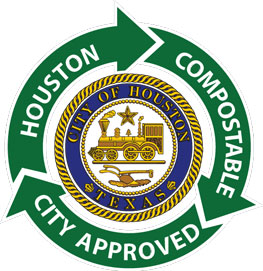Solid Waste Management Department
Compostable Bags
When it comes to Yard Trimmings, You have options!

Look for the City Approved logo on boxes of Compostable bags
Visit each tab for more Information
Grasscycling | Compostable Bags | Composting
Compostable Bag program has taken effect as of April 5, 2010
 |
|
 |
YARD TRIMMINGS TO CLIP UP TO $2 MILLION:
COUNCIL APPROVES COMPOSTABLE BAGS FOR CITY COLLECTION
In an effort to save taxpayers substantial money and keep compostable yard waste from needlessly filling up costly landfills, the City of Houston will soon begin requiring the use of compostable bags for such waste.
The City Council on September 2, 2009, approved an ordinance amending Chapter 39, Article IV, of the Houston Code of Ordinances, Collection Services. This change requires residents to use “compostable bags” for City collection of green organic material beginning 90 days from passage of the ordinance.
“Each year tons of leaves, grass clippings and small branches are needlessly tossed into landfills. Diverting an anticipated 60,000 tons of organic material per year from area landfills will result in disposal savings of up to $2.0 million,” said former Mayor Bill White.
“There are free alternatives to purchasing compostable bags for City collection,” said Harry Hayes, Solid Waste Management Department Director. Residents may leave their grass clippings on their lawn (grasscycling) or compost their yard trimmings for use in flower beds or gardens rather than bagging. This is a natural and excellent lawn fertilization product. “Twenty-one states have already banned yard trimmings from landfills. Houston’s move is a step in the right direction to preserve valuable landfill airspace. This was prominently noted in the Mayor’s Solid Waste Task Force Commission’s Final Report in 2007 (chaired by Controller Annise Parker and Businessman Lorne Bain),” added Hayes.
Compostable bags are made from compostable-polymers or other renewable resources and decompose naturally like other organic materials. Regular plastic bags take over 100 years to break down. Compostable bags begin decomposing in as little as three (3) months and leave no harmful residue behind.
Residents are reminded that the organic material must be in compostable bags bearing the City of Houston logo that will be made available in retail stores throughout the city beginning Mid-December, 2009. For more information on compostable bags or composting, log on to www.houstonsolidwaste.org.
The Solid Waste Management Department provides solid waste service to the citizens of Houston through the collection, disposal and recycling of discarded material in a manner that is safe, efficient, environmentally sound and cost-effective.
What are Compostable Bags?
Compostable Bags are city-approved waste bags that are certified to meet ASTM 6400 standards to be compostable. Many people often are confused because some people call compostable polymers plastic. This sometimes gives people the impression that these bags will not degrade or that they should be the same price as a regular plastic bag. A majority of compostable bag manufacturers use Compostable Polymers. If they did not the bag would fall apart. Bags cannot be made simply from starch. Most of our resins must be mixed with Compostable Polymers to give the bag strength and stretch.
How do compostable bags work versus regular polyethylene (poly) based bags?
According to research, polyethylene based bags can take over 100 years to degrade and are not compostable. Less than 2% of all plastic bags are recycled. Compostable bags are products based on natural products such as starch, vegetable oil, and other renewable resources.
Compostable polymers are renewable because they are made from plant materials which can be grown year upon year indefinitely. These plant materials come from agricultural non food crops. Therefore, the use of polymers would create a sustainable industry. In addition compostable polymers have the potential to cut carbon emissions and reduce CO2 quantities in the atmosphere: this is because the CO2 released when they degrade can be reabsorbed by crops grown to replace them. This makes them close to carbon neutral.
Some compostable polymers are compostable: they are broken down into CO2 and water by microorganisms. In addition some of these compostable polymers are compostable: they can be put into an industrial composting process and will break down by 90% within 6 months. Compostable polymers that do this can be marked with a “compostable” symbol under certified by the BPI under ASTM 6400-04 and DIN Certco under the EN 13432(2000) standards. Packaging marked with this symbol can be put into industrial composting processes and will break down within 6 months (or less). Compostable plastics mean plastics that are compostable under “composting” conditions: specified humidity, temperature, microorganism and timeframe.
Compostable polymers are an alternative to petroleum-based polymers (traditional polymers like polyethylene, polypropylene which are not compostable or compostable)
How long does it take for a compostable bag to degrade?
Below are results photos of a controlled decomposition test supplied to the Solid Waste Mgmt. Dept. for your information. This test was conducted over a period of four weeks at 60 degrees Celsius (140 degrees Fahrenheit). The compostable-bag material was placed into a metal ring for demonstration purposes.
How do I store Compostable Bags?
Compostable Bags should be stored in a cool, dry area, out of direct sunlight or direct heat. The Compostable Bags should be stored in temperatures less than 80 degrees.
Compostable Bags and Composting Links
| ASTM D6400 - 04 Standard Specification for Compostable Plastics | |
| Don't Bag It - Compost Management Plan | |

